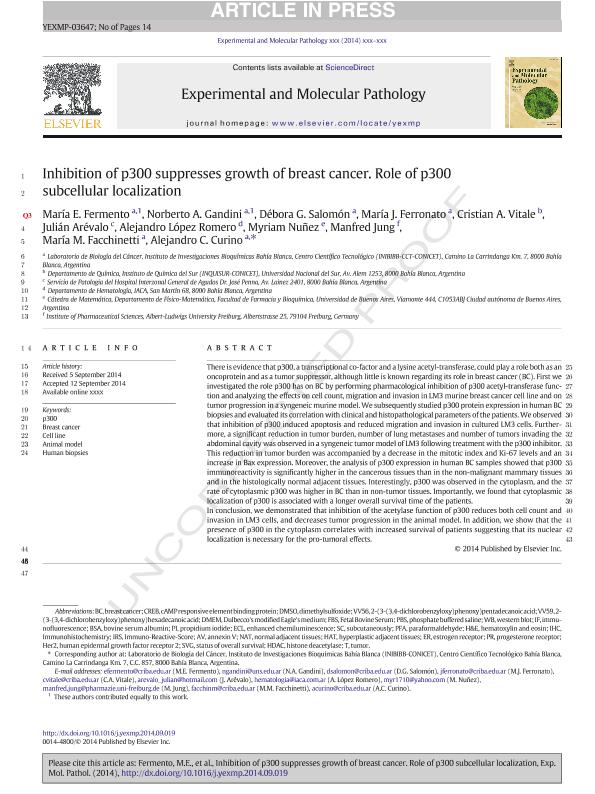Artículo
Inhibition of p300 suppresses growth of breast cancer. Role of p300 subcellular localization
Fermento, María Eugenia ; Gandini, Norberto Ariel
; Gandini, Norberto Ariel ; Salomón, Débora Gisele
; Salomón, Débora Gisele ; Ferronato, María Julia; Vitale, Cristian Alejandro; Arevalo, Julian; Lopez Romero, Alejandro; Nuñez, Myriam Carmen; Jung, Manfred; Facchinetti, Maria Marta
; Ferronato, María Julia; Vitale, Cristian Alejandro; Arevalo, Julian; Lopez Romero, Alejandro; Nuñez, Myriam Carmen; Jung, Manfred; Facchinetti, Maria Marta ; Curino, Alejandro Carlos
; Curino, Alejandro Carlos
 ; Gandini, Norberto Ariel
; Gandini, Norberto Ariel ; Salomón, Débora Gisele
; Salomón, Débora Gisele ; Ferronato, María Julia; Vitale, Cristian Alejandro; Arevalo, Julian; Lopez Romero, Alejandro; Nuñez, Myriam Carmen; Jung, Manfred; Facchinetti, Maria Marta
; Ferronato, María Julia; Vitale, Cristian Alejandro; Arevalo, Julian; Lopez Romero, Alejandro; Nuñez, Myriam Carmen; Jung, Manfred; Facchinetti, Maria Marta ; Curino, Alejandro Carlos
; Curino, Alejandro Carlos
Fecha de publicación:
09/2014
Editorial:
Academic Press Inc Elsevier Science
Revista:
Experimental And Molecular Pathology.
ISSN:
0014-4800
Idioma:
Inglés
Tipo de recurso:
Artículo publicado
Clasificación temática:
Resumen
There is evidence that p300, a transcriptional co-factor and a lysine acetyl-transferase, could play a role both as an oncoprotein and as a tumor suppressor, although little is known regarding its role in breast cancer (BC). First we investigated the role p300 has on BC by performing pharmacological inhibition of p300 acetyl-transferase function and analyzing the effects on cell count, migration and invasion in LM3 murine breast cancer cell line and on tumor progression in a syngeneic murine model. We subsequently studied p300 protein expression in human BC biopsies and evaluated its correlation with clinical and histopathological parameters of the patients. We observed that inhibition of p300 induced apoptosis and reduced migration and invasion in cultured LM3 cells. Furthermore, a significant reduction in tumor burden, number of lung metastases and number of tumors invading the abdominal cavity was observed in a syngeneic tumor model of LM3 following treatment with the p300 inhibitor. This reduction in tumor burden was accompanied by a decrease in the mitotic index and Ki-67 levels and an increase in Bax expression. Moreover, the analysis of p300 expression in human BC samples showed that p300 immunoreactivity is significantly higher in the cancerous tissues than in the non-malignant mammary tissues and in the histologically normal adjacent tissues. Interestingly, p300 was observed in the cytoplasm, and the rate of cytoplasmic p300 was higher in BC than in non-tumor tissues. Importantly, we found that cytoplasmic localization of p300 is associated with a longer overall survival time of the patients. In conclusion, we demonstrated that inhibition of the acetylase function of p300 reduces both cell count and invasion in LM3 cells, and decreases tumor progression in the animal model. In addition, we show that the presence of p300 in the cytoplasm correlates with increased survival of patients suggesting that its nuclear localization is necessary for the pro-tumoral effects.
Palabras clave:
Breast Cancer
,
P300
,
Cell Line
,
Animal Model
,
Human Biopsies
Archivos asociados
Licencia
Identificadores
Colecciones
Articulos(INIBIBB)
Articulos de INST.DE INVEST.BIOQUIMICAS BAHIA BLANCA (I)
Articulos de INST.DE INVEST.BIOQUIMICAS BAHIA BLANCA (I)
Citación
Fermento, María Eugenia; Gandini, Norberto Ariel; Salomón, Débora Gisele; Ferronato, María Julia; Vitale, Cristian Alejandro; et al.; Inhibition of p300 suppresses growth of breast cancer. Role of p300 subcellular localization; Academic Press Inc Elsevier Science; Experimental And Molecular Pathology.; 97; 9-2014; 411-424
Compartir
Altmétricas



